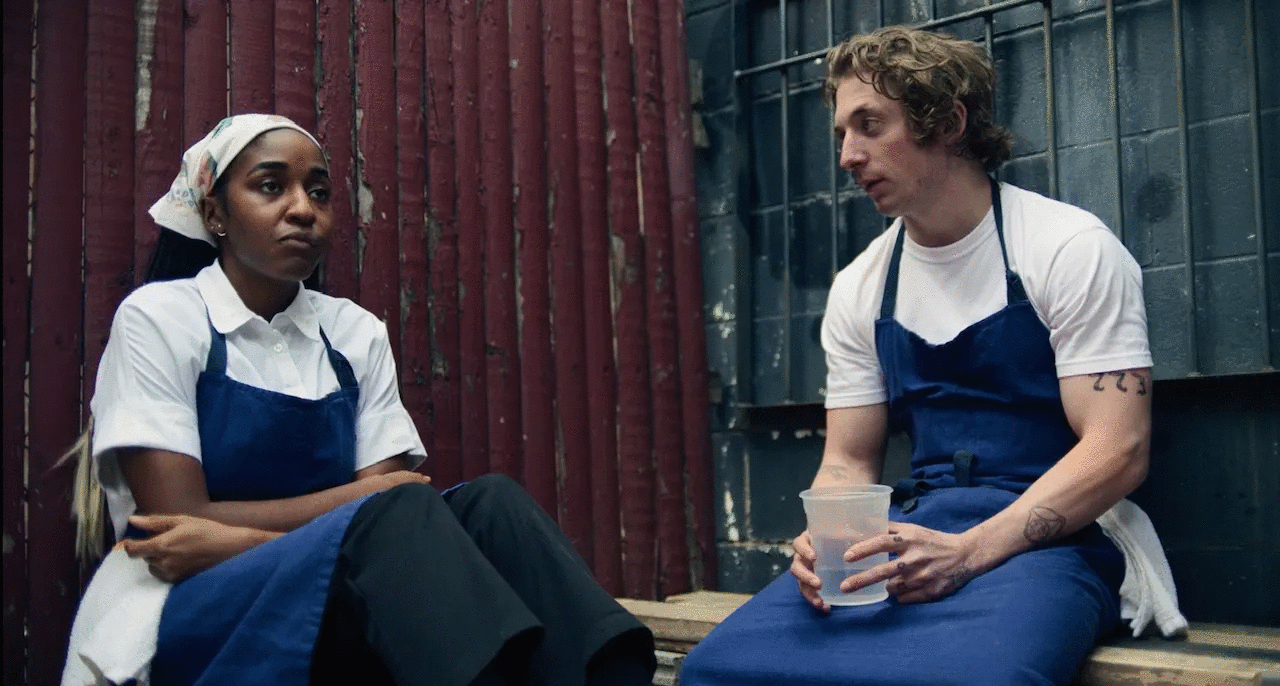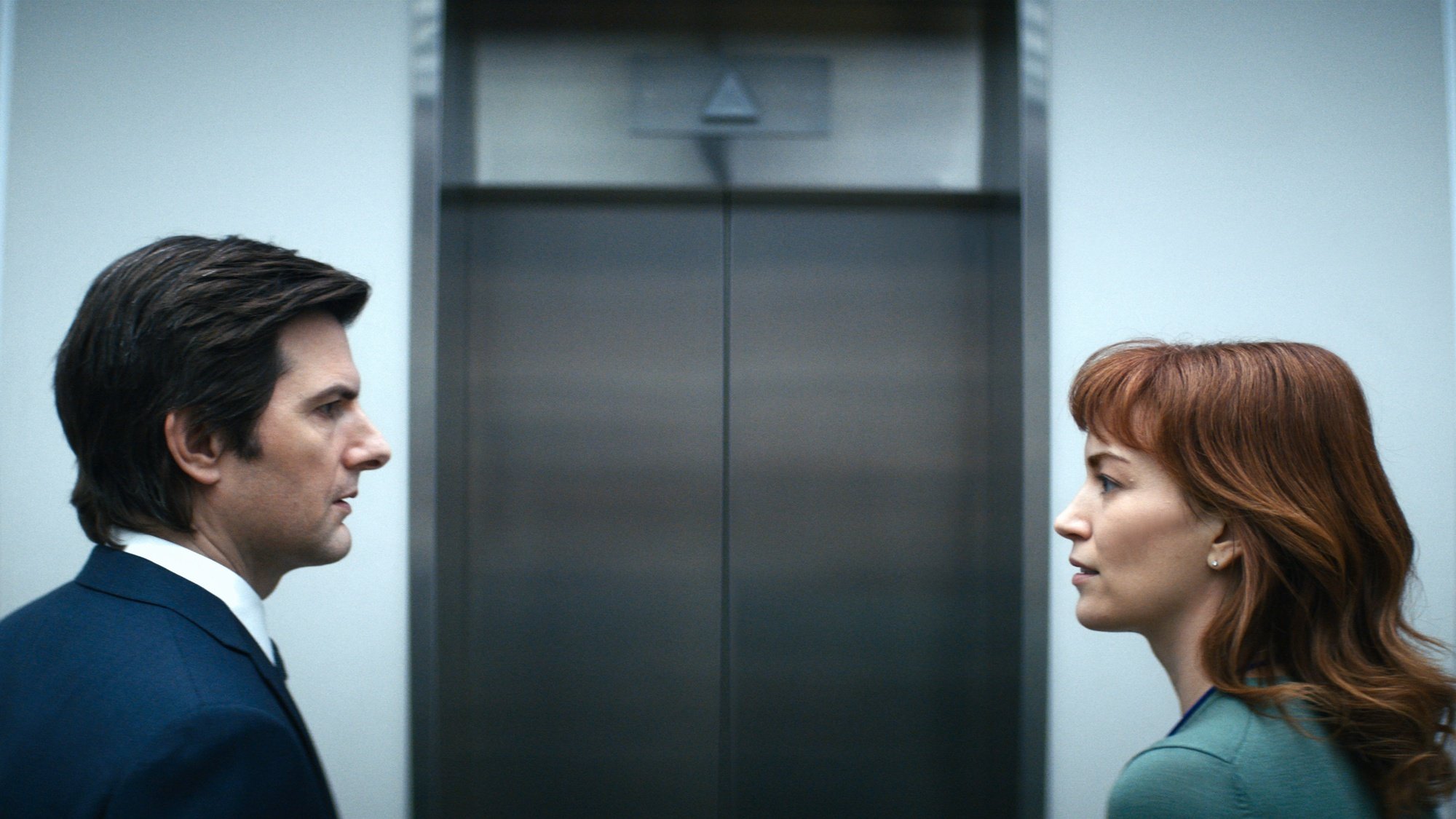To Sever or to Sweat: workplace drama in the age of prestige TV
Severance created by Dan Erickson; The Bear created by Christopher Storer
Essay by Matt Campbell
In recent years - particularly since the worst days of the COVID pandemic in 2020 — rhetoric around work culture has undergone a shift. The great resignation, quiet quitting, and a general rejection of the proverbial “grindset” are all symptoms of a generation attempting to heal the necrotic wounds of a bygone era; an era in which the middle-class family could thrive on a single forty-hour-per-week salary.
At the same time as this shift in workplace attitudes came the meteoric rise of streaming services. Film studios have all but abandoned the mid-budget production, and traditional TV networks have largely pivoted towards a streaming model. These developments have ushered in a new era of content — the age of “prestige TV” (a term referring to the elevation in quality of TV shows beginning in the late nineties and early oughts, as noted by Princess Weekes).
There was once a time when television shows — even the forty minute dramas — were comparatively low-budget and lowbrow, and the best talent in any category was reserved for film. This slowly began to change with shows like The Sopranos, The Wire, Breaking Bad and Mad Men. The higher quality of writing, performances, direction and production of these shows garnered more respect than TV previously had. Now, more than twenty years after The Sopranos first aired, serial dramas have come to be watched and discussed with almost the same critical fervour once only reserved for films.
It was only a matter of time, then, until a new prestige TV drama that centred on a workplace came around. In 2022, we got two of them, and they paint very different pictures of workplace survival in the twenty-first century, but still communicate a similar message.
Light spoilers start here, and heavy spoilers will follow, so go watch both of these fantastic shows (Severance on AppleTV+ and The Bear on Disney+) if you fear them being spoiled.
Adam Scott, John Turturro, Britt Lower and Zach Cherry as the workers in Severance
Severance, created by Dan Erickson and directed by Ben Stiller and Aoife McArdle, follows a small team of employees (lead by Mark, played by Adam Scott) who have all undergone a procedure that splits their consciousness and memories between their work and personal lives. Each day when they arrive at their mysterious workplace — the Macrodata Refinement department of the Lumon company — they enter the elevator and their “innie” (their work consciousness) wakes up. When they leave, their “outie” resumes control. Each half has no knowledge of what the other experiences.
From either perspective, the lift doors simply close and open as though no time has passed. The outie maintains all of their pre-severance memories, but the innie is a newborn consciousness who only exists at work. The innie awakens after the procedure, is informed of their situation, works their first day, gets in the lift to go home and immediately steps back out into their second day, having driven home, showered, seen their loved ones, slept, and returned to work… without experiencing any of it. Over the course of nine episodes in the first season, malcontent grows amongst the team as they attempt to discover what Lumon actually does and why.
The Bear, created by Christopher Storer and directed by him and Joanna Calo, takes place in a failing Chicago sandwich restaurant, The Beef, that has been left to world-class chef Carmy (Jeremy Allen White) by his recently deceased brother. In the first season’s eight episodes, Carmy attempts to make The Beef profitable and win over the other long-employed cooks with the help of a new, highly-trained sous chef (Sydney, expertly portrayed by Ayo Edebiri) and perhaps reconcile things unsaid between him and his departed brother.
The two shows, like the workplaces they depict, differ greatly. To compare the essence of both is to understand the essence of twenty-first century labour: to achieve the best possible results at work, workers must either see their outcomes and truly care about what they do, or they must be totally unable to access anything else the world has to offer. This may seem like a hyperbolic thesis posed by an overeducated, jaded blue-collar worker who loves screen art and hates modern work culture, but the truth of the statement is clear in both the explicit text of each show as well as their more symbolic, thematic elements.
Take the flat corporate structure of The Beef as compared to the tall, thin structure at Lumon. Carmy is the owner/operator chef de cuisine who directly oversees his employees, and works hands-on by their side every day.These employees are very aware of the troubles and successes of the business they work in. How could they not be? They live and breathe it. Lumon has a board, a C-suite, upper management, middle management, team leaders and bottom-rung workers. The severed employees have absolutely no contact with those at the top, and even upper management must communicate with the board through a smug representative with an earpiece. Why should the severed endeavour to work hard when they know neither why nor for whom they’re doing it?
The cooks at The Beef are constantly engaged, always moving, and thriving in a frenzied kitchen with their boss at the helm. The work is gruelling, sweaty, dangerous, and the visual depiction of lunch service is almost violent. The four vaguely-titled “Macrodata Refiners” at Lumon spend their days quietly and slowly grouping data sets by way of emotional response: their work borders on dissociative.
A close friend of mine spent some time running pass in the kitchen of an elite resort, and as he watched parts of The Bear alongside me, he commended how accurately it depicted the extreme experience of that kind of labour. He acknowledged that it is high-pressure, brutal and profane, but speaks of it with a fondness that comes from excelling at very difficult work and achieving the flowstate mindset of pure experience. I’ve spent time as an administrative assistant in an office with a concerningly similar layout and colour palette to that of Macrodata Refinement, and I can confirm that work of that kind is usually the farthest thing from a purely experiential mindset. At the risk of painting with too broad a brush, it seems that kitchen workers, both in real life and in The Bear, exist only in the physical moment, while desk jockeys, both in real life and in Severance, spend more time in their head than in the real world.
It’s pretty clear why our generation is beginning to reject the work-life status quo. Not only are we underpaid and overworked, but we are expected to be so for decades, to not question why we should care, and to accept that there is no more purpose to be found in our work than a thin paycheck.
In The Bear, Carmy wants to keep his brother’s legacy alive through the restaurant, Sydney wants to connect with childhood sentiment, and pastry chef Marcus wants to let his passion flourish. In Severance, character motivations are more difficult to ascertain: for the innies, work is literally all they know. They were created there, they do not sleep, and they only exist at work. They are totally unaware of their outie’s reason for choosing to sever. They work because an unknown part of themselves forced them to, and they’re encouraged by corporate promises of petty incentives like finger traps and Music Dance Experiences.
The doldrums of work and the harm they cause are evident in the character of Helly. Severance opens with her immediate post-severance induction. She has trouble adjusting to her situation, and in episode four she attempts suicide as a response to her outie preventing her from resigning. In the final episode, it is revealed that Helly’s outie is the daughter of Lumon’s CEO, and that she chose to become severed to prove to the world that the procedure is a good thing. This is the most scathing indictment of work culture made by the show: a wealthy, privileged, high-ranking member of the company takes a job on the severed floor in an attempt to display class solidarity, and the reality of life at the bottom drives her innie to suicide. She certainly proved a point, just not the one she’d hoped to.
All of this is not to ascribe some level of inherent value to blue-collar work over white-collar work, or to say that it is impossible to find meaning in menial tasks. The message here is that employees and employers alike benefit most from transparency, a common understanding of why the work is important. Workers thrive when they are engaged, when they’re empowered to have input, when they have true agency rather than the illusion of choice.
It’s pretty clear why our generation is beginning to reject the work-life status quo. Not only are we underpaid and overworked, but we are expected to be so for decades, to not question why we should care, and to accept that there is no more purpose to be found in our work than a thin paycheck. When forced to blindly submit to the whims of a corporate spectre, workers’ lives become something represented by the keyboards in Macrodata Refinement — an object with no control, and no escape.
Severance is currently streaming on Apple TV+.
The Bear is currently streaming on Disney+.
Matt Campbell is a floral-scented lover of language who delivers parcels better (and more often) than he delivers verses of poetry.
This essay was generously donated by Matt.
Like this essay? Buy us a $5 coffee here. You can do it once, once a month or as many times as you like.





